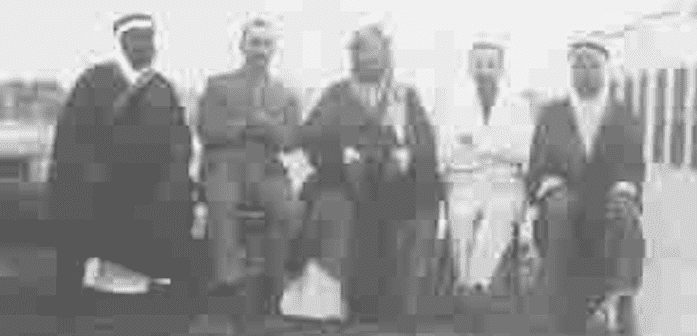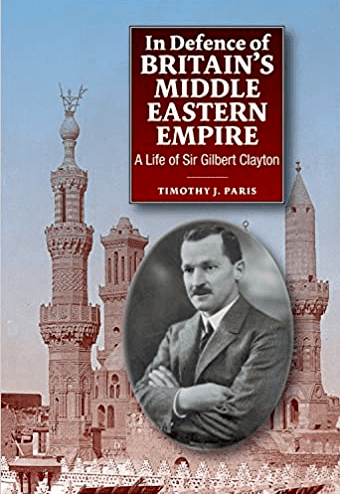Timothy J. Paris is a historian, lawyer, and author of two books on the Middle East, most recently In Defense of Britain’s Middle Eastern Empire: A Life of Sir Gilbert Clayton, published in 2015. Paris received his Ph.D. in history from Cambridge University, and his first book was titled Britain, the Hashemites and Arab Rule, 1920-1925: The Sherifian Solution, published in 2003. His fascinating and rich biography of Clayton sheds light on a key figure in the formulation of British policy in the Middle East both during and after World War I, even as it describes someone largely unknown to a general public. It is to discuss the biography that Diwan interviewed Paris in early January.
Michael Young: It took you six years to research and write your biography of Gilbert Clayton. Why choose him as a topic?
Timothy J. Paris: So much has been written about the Great War and its aftermath in the Middle East that I was surprised no one had published a biography of Clayton, who was involved, in varying degrees, in nearly all the big issues of the period. A Clayton biography thus presented an opportunity to fill a gap in the historiography. On a personal level, I thought it would be fun to write a biography and, since Clayton worked in such a variety of regions and contexts, to learn more about some areas with which I had less familiarity, such as Egypt and the Sudan. Also, I wanted to write a book that would be accessible to an audience wider than the academic community. So, this work contains a substantial amount of background material that would be neither necessary nor appropriate for the specialist.
MY: You touch on a central debate in modern Middle Eastern historiography, namely who fooled whom during World War I? Did Britain fool the Arabs by promising them an independent state in exchange for turning against the Ottomans, while agreeing with France to divide the Middle East between themselves? Or did the Arabs fool the British into thinking that they might favor the Ottomans and Germany in order to secure what they wanted, when this was always unlikely?
TJP: Certainly, there was a fair amount of duplicity all around. The British, French, Arabs, and Zionists were all guilty of misrepresentations made to suit their own ends. The Arabs, through Mohammed Sharif al-Farouqi, an Arab officer in the Ottoman army who had defected and persuaded British officials that the Arabs might side with Germany if Britain did not support an Arab revolt against the Ottoman Empire, unquestionably misled the British. This led the officials—including Clayton—to wrongly conclude that an Arab-German alliance was imminent in 1915. But, for Clayton, the Farouqi interviews affected timing only; he was already convinced that an Anglo-Arab alliance was critically important to the British position in the Middle East. The pledge made in 1915 by the British high commissioner in Egypt, Sir Henry McMahon, to the sherif of Mecca, Hussein bin Ali, that Britain would support an independent Arab state or states in Arab territories, which was prompted by those interviews, while intentionally ambiguous and open-ended, may not have been calculated to deceive. However, it became deceptive in light of the Sykes-Picot Agreement, the Balfour Declaration, and the various British pronouncements of 1918, none of which can be squared with the 1915 pledge.
MY: You suggest that the Arab Revolt, long regarded popularly as a thing of legend due to the participation of T. E. Lawrence, was actually something with which the British authorities in Cairo, civilian and military, initially did not want to be identified. Why?
TJP: Most of the opposition to British sponsorship of the Arab Revolt came from the Government of India and the India Office. In the region itself, there was some doubt early on whether the expenditure of British money, equipment, and maybe men would be worth the candle and no one, least of all Clayton, believed that a revolt would be militarily significant. There was also concern that early Hashemite plans, in 1915, to promote a revolt in Syria would antagonize France, which sought influence in postwar Syria. Finally, there was uneasiness that British involvement in an Arab revolt would be construed in the Islamic world as interference in the Muslim Holy Places.
However, by late 1915, all the leading British authorities in the region—McMahon, General Sir John Maxwell, commander of the British army in Egypt, Sir Ronald Storrs, the oriental secretary at the British Agency in Cairo, Sir Reginald Wingate, at the time governor-general of the Sudan, and Clayton—were fully persuaded of the merits of British support for a revolt. Opposition continued from India and, in Egypt, from General Sir Archibald Murray, who replaced Maxwell as commander in chief, Middle East, in March 1916, and thought that the revolt was a wasteful frolic and detour.
MY: You appear to be trying to thread the needle over Clayton’s views of the Balfour Declaration. On the one hand, you argue that he was committed to implementing the declaration, as this was official British policy. However, you also write that he seemed to admit that it was unworkable. Where precisely did he stand?
TJP: I may be guilty of needle-threading in describing Clayton’s views of the Balfour Declaration and Zionism (and perhaps some needle-threading was required at that time). But it is more a recognition of the fact that Clayton’s views changed over the years. Initially, he, like many others, was baffled by the phrase “national home for the Jewish people.” And he wasn’t helped by the laughable Foreign Office instruction that he develop the policy “on right lines.” Whatever the declaration meant, though, Clayton was convinced that Britain must proceed slowly with the national home policy. And he became even more convinced that gradualism was required when he learned from the Zionist leader Chaim Weizmann in March 1918 that a Jewish state in Palestine was the Zionist objective. Yet, Clayton supported the declaration: first, because as a British officer and civil servant that was his job; and second, because he really did believe that, if slowly and carefully applied, the Zionist program had a chance of success.
I have given many examples in the book of Clayton’s adherence to the British policy of support when he acted as administrator of the Occupied Enemy Territory Administration and chief political officer in Palestine (1918), and later as chief secretary (1923–1925) in the Mandate government. But, by late 1923, Clayton was convinced that the British government was not fairly applying the policies laid down in the June 1922 White Paper, which affirmed that the Balfour Declaration did not mean that Palestine as a whole would become a Jewish state. In the face of many frustrations, he came to appreciate the depth of Arab opposition to Zionist policy. Despite his best efforts, he realized he could do nothing to reconcile Arab and Jew.
MY: As a political officer in Egypt, Clayton was instrumental in pushing for a gradual handing over of governance duties to the Egyptians themselves, a pattern he would repeat in Iraq when he was high commissioner there in 1929. What was his rationale, and how did the British authorities respond to his recommendations?
TJP: Clayton’s thinking was simple enough. He believed that both Egypt and Iraq were capable of running their own governments and that it was neither necessary nor desirable to impose British methods in either country. And he didn’t much care if those governments were run efficiently, by British standards. A passage in a July 1929 letter to colonial secretary Lord Passfield summarized his attitude: “Iraq has reached a stage at which further progress in self-government and self-reliance can only be achieved as a result of a system of trial and error. She will only realize and learn to surmount her difficulties by being able to face them herself.”
What Clayton considered important for Britain was reflected in the so-called “reserved issues clause” of the Allenby Declaration of February 1922 and in the Anglo-Iraqi Treaty of June 1930. There was, of course, pushback from London, particularly with regard to Egypt in 1922, as prime minister David Lloyd George, secretary of state for the colonies Winston Churchill, and, to a lesser extent, foreign secretary George Nathaniel Curzon, all opposed dissolution of the protectorate in Egypt, a designation Clayton thought offensive to Egypt and meaningless to Britain. It took the powerful personality of General Edmund Allenby, then the high commissioner in Egypt, to push through the 1922 Declaration. As for Iraq, there was opposition so long as the Conservative government and colonial secretary Leo Amery held sway. But when Labor prevailed in the May 1929 general election, “conciliation” became the byword in imperial policy and Clayton’s policy won out.
MY: How would you describe Clayton personally? He comes across in your book as something of a cipher—an agile and competent bureaucrat who sometimes seemed to dance between the raindrops, but otherwise left few visible fingerprints. In your research how did he come across to you, professionally and personally?
TJP: Clayton was a very good diplomat and negotiator and his imprint on Egypt, Iraq, Transjordan, and Arabia was clear, if not indelible. In a historical context, he might best be characterized as one of those transitional figures in moving Britain from a formal to an informal empire, though his ideas on devolution were neither novel nor unique. As an intelligence director in Egypt his political work was good and his tactical intelligence efforts adequate, but not outstanding, during a period when the intelligence trade (apart from human intelligence) was in a nascent stage.
Personally, Clayton was indeed something of a cipher. His views on a wide variety of issues come through in his correspondence and in official papers, but there is little in the way of self-revelation. He kept his own counsel and self-aggrandizement formed no part of his personality. Insightful, but not entirely accurate, assessments of him were made by two colleagues who knew him well—T. E. Lawrence and Ronald Storrs—and both their opinions are worth reviewing.
MY: You close your book by affirming that Clayton was regarded as a friend of the Arabs. You also underline that his primary focus was to defend the interests of the British Empire. Are these two compatible?
TJP: First, I must say I considered that my job as a biographer was to amass all the evidence I could find concerning Clayton, and then to accurately and fairly assess the man in the context of his time. It was no part of my job to consider him in the context of 21st century standards and mores, when the mere mention of the word “imperialism” drives some people to apoplexy. That being said, there were certainly some Arabs at the time who regarded anything less than istiqlal tamm—complete independence—as anathema and were intent on removing any vestige of Western influence in the Middle East, except for diplomatic representation. For these people, Clayton was no friend.
However, I concluded that the bulk of informed Arab opinion at the time did regard Clayton as a friend, and that this belief was accurate. His views on dissolution of the protectorate and internal autonomy in Egypt and on admission of Iraq into the League of Nations (symbolic of its independence) were no secret and were applauded by most Arabs. And Emir Abdullah in Transjordan and Abd al-Aziz Al Saud in Arabia had good reason to express their dismay over Clayton’s death in 1929. It is quite true that Clayton sought to protect what he regarded as vital British interests in these countries, but many Arabs at the time understood that the transition to complete independence could not be achieved overnight and that Clayton, in contrast to many of his compatriots, was advocating a reduction in British influence and was thus making progress in the direction they desired.


